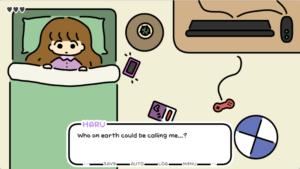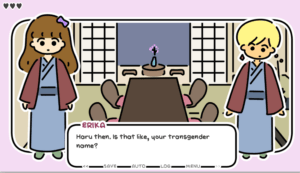For this critical play, I played One night, Hot springs developed by npckc. The game follows the story of Haru, a transgender woman who is invited to the hot springs for her friend’s birthday. The game takes on a narrative form with the player able to click through dialogue and make choices at certain junctures. The story follows Haru as she decides to go to the hot springs and navigates the experience of going to the baths there. There are multiple endings based on the player’s choices at different junctures.

I thought this game was a really interesting depiction of feminist storytelling — one thing I noticed was that there was no climax or main conflict. Instead, like how the book mentioned, story and structure combine with themes for exploration of important content. There is no pivotal choice or sequence of choices that a player has to make to ultimately reach their outcome. Instead, the narrative richness and themes intertwine and paint a picture of Haru’s fears and society’s transphobia.
I thought the creator utilized the game mechanics in such an interesting way — at first, when I was playing this game I thought it was similar to Episode where the player follows a narrative and has to make key choices often relating to actions in relationships and appearances that have consequences down the line. However, as I played this game, I noticed that the more interactive portions where players had to select a choice all pertained to agency over identity. Everytime Haru had to make a decision whether it was to share her identity with a staff member at the hot springs or converse with Erika and call her out regarding terminology, the player was given a choice. Even at the very start of the game, the choice of whether to accept the invitation to the hot springs is presented as a choice to the user. And, instead of the game having negative consequences for picking a choice like in other narrative-based games, it simply proceeds — with whatever the player selected. I thought this was a really cool way to give agency to the player and also served as an underlying message that the decision to share your identity is a completely personal choice. The way the creator utilized these mechanics made it an “agentic-training tool” as the book mentioned.

I do wish this game was longer — in playing this game and reading about the examples in the canvas post, I noticed that a significant amount of games that prioritize intersectionality, feminism or representation take on narrative forms. However, with narrative games, a tradeoff exists between capturing the user’s attention and the length of the narrative. So while I understand why this game is short and contained and how it contributes to the game maker’s intentions, I wish there was a more fleshed out and longer narrative. I also wish there was a way to perhaps show the player the full depth of the game without having to play multiple times. I feel like I really experienced this game after playing through different endings but I wish there was some way to incorporate the themes from various endings into a singular linear narrative, with the option for multiple endings.



